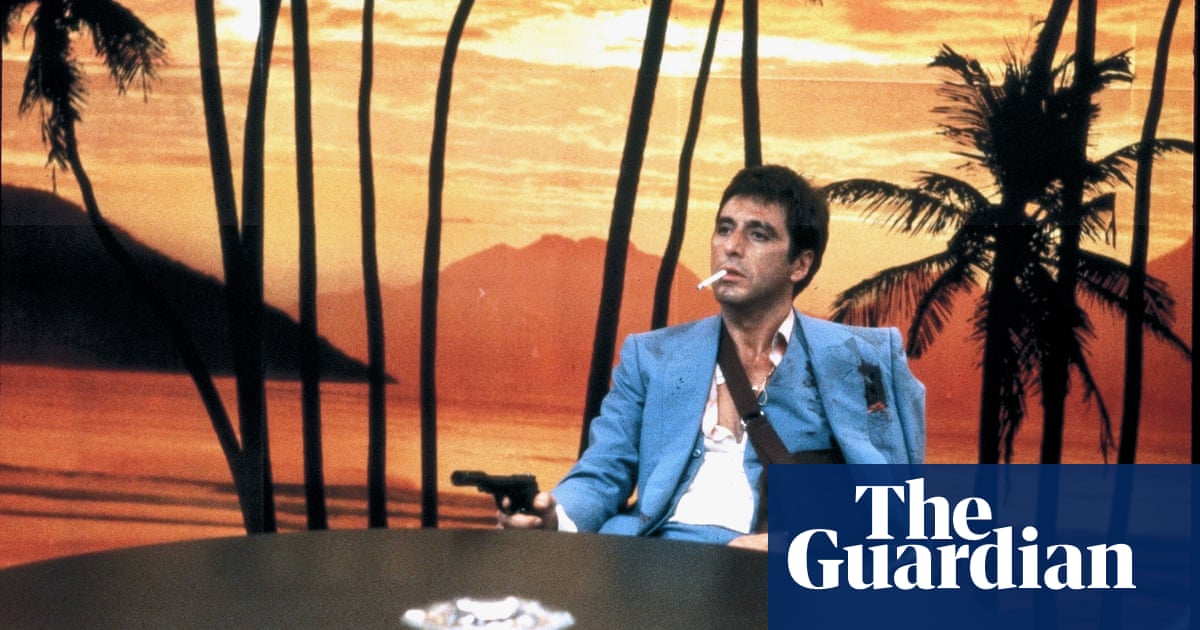
Forty years out from Scarface storming American cinemas in a hail of machine-gun fire, why is Tony Montana still idolized by dealers, mafiosos, gangsters, gangstas, rappers and anyone else vowing to live large outside the law?
His nearly three-hour biography qualifies as tragedy, the story of a rage-choked cocaine addict with minimal self-control and a possible incest kink who methodically alienates everyone he’s ever held dear until he is gruesomely murdered for his impulsivity and hubris. He spends his twilight years paranoid, tasteless, violent and miserable, equal parts cautionary tale and mad king(pin). He’s not exactly an aspirational figure.
But then, of course he is – Tony’s the rapacious spirit of the American dream incarnate, an avatar for the grabby avarice of Reaganomics slotted into Cuba’s history of friction between communists and capitalists. He fled the island in the Mariel boatlift of 1980 (shown in archival footage over the opening credits, the collage effect the first trick director Brian De Palma pulls from his formally unpredictable pop-art grab bag), a mass exodus toward Floridian shores in the wake of Castro’s ruling to release his political opponents from prison. Once set up moving coke in a garish, neon-laced Miami hopped up on Giorgio Moroder’s synth grooves, Tony breaks the assimilation world record as he adopts a can’t-tell-me-nothing individualism in tune with his new nation’s origin myth. He takes what he wants and he wants everything. As goes the motto for Trans World Airlines – a company long run by Howard Hughes, a fellow star-spangled maverick consumed by his own obsessions – The World Is Yours. Even in defeat, he goes on his own terms, flaming out in a blaze of glory that takes the “live free or die” rallying cry literally.
Those in Tony’s line of work have long resolved this dissonance with the proverb that when you live by the gun, you die by it, too; for De Palma and screenwriter Oliver Stone, weighing sober assessment against wild-eyed glorification required a steadier hand. In Scarface’s initial theatrical run, many critics savaged it for the giddy violence that earned an X rating from the MPAA in its first four cuts, a buffet of carnage splayed from a dismemberment by chainsaw to the grand finale’s orgy of bullets. It’s worth considering that gaudy excess may be part of the point in a film that sets its protagonist’s darkest hour in a hot tub of Caligulan proportions, though there’s no archness or detachment to reassure us with satire. The register falls much closer to self-parody, a tonal extension of Tony’s over-the-top home decor curated under the principle that there’s no such thing as too much black marble. (In this respect, we might fairly call this film De Palma’s Showgirls, another manic ascent to power that suggests Las Vegas as Miami West in its embodiment of shameless go-go hedonism.)
Confounding and clarifying matters is Al Pacino’s tooth-gnashing performance as Tony, perhaps the exact midway point between his virtuosic turns in the 70s and his drift into caricature with the Hoo-ahs of the 90s. He makes use of the same skills honed during his training in the Method, with its emphasis on spontaneity articulated in Pacino’s off-the-cuff ad libs and volatile physicality. And this fits for someone like Tony, who intimidates rivals and underlings with his combination of inscrutable stoicism punctuated by random flare-ups of anger, dovetailing nicely with Pacino’s habit of dominating a scene partner by peppering them with little questions. In courting his boss’ moll, Tony’s seduction strategy amounts to little more than talking and talking and talking until she acquiesces to his attention.
All the while, a plague of tics threatens to overtake a great actor, his mannered style getting away from him most direly in his impression of the Cuban accent. Saying hello to one’s “li’hl fren” has been run into the ground by 1m unfunny office guys, in part because it’s so easy to lock into Pacino’s broad plan of attack against the borrowed phonetics. His burlesque of Latino identity sticks out as the stalest part of a film forward-looking in its hysterical bloodletting and American idiocy, though the casting of Italian-Americans Pacino, Robert Loggia and Italian-Syrian F Murray Abraham speaks to an interchangeability between ethnic immigrants sharing in the same bum check for life, liberty and all that hokum.
At the time of the film’s debut, real-life Cubans spoke out against Tony not for appropriation but for promoting stereotypes, casting the so-called “Marielitos” as thugs in an expository intro far overstating the quotient of criminals boating over. The film’s producers were compelled to add a post-credits disclaimer explaining that Cuban-Americans are by no means a monolith, presumably before those crying foul had the chance to see the scene in which Tony’s mother excoriates him for giving Cubans a bad name.
That’s the clearest moral signpost in a film that loses little sleep over mandates of virtue, in particular the charge of glamorizing the very thing it’s set out to critique. We never tarry with the external fallout of Tony’s dirty doings; his is the only addiction with screen time and except the meaningful casualties of the final act, the lives lost in his wake are those of anonymous, dispensable goons. Much like The Wolf of Wall Street – which has likewise cultivated a legion of blinkered fans taking their graven text as a portrait of an awesome dude with a great life – Scarface adheres to the tenet that the seductive grotesquerie of extreme wealth cannot be laid bare without first recognizing its narcotic appeal. Every crash comes from a proportionate high and few characters in the annals of cinema have shown such dedication to being on cocaine as Tony Montana.
If his dangerously overcharged lifestyle has the luster of fantasy, that’s only because it beats working for a living. His most triumphant moment doesn’t come when he’s finally dispatched his last obstacle to the throne, but rather much earlier, as he and his best friend quit their dead-end dishwashing gigs at a sweltering taco stand and swagger away. They’ve just set out on the path to damnation and for so many classes of the all-American striver harboring dreams of mobility, it’s the only one with an upward incline.












